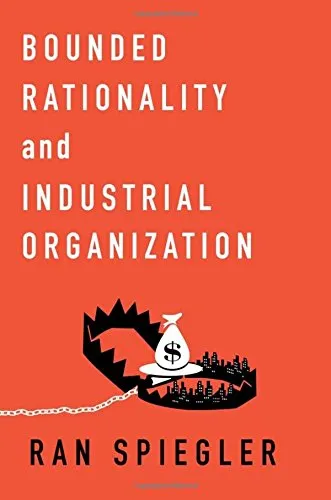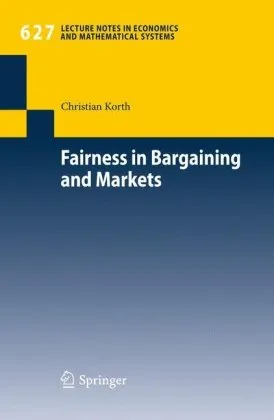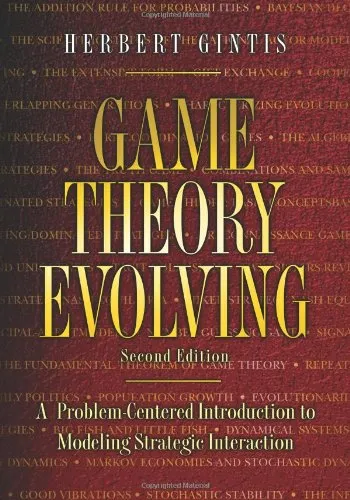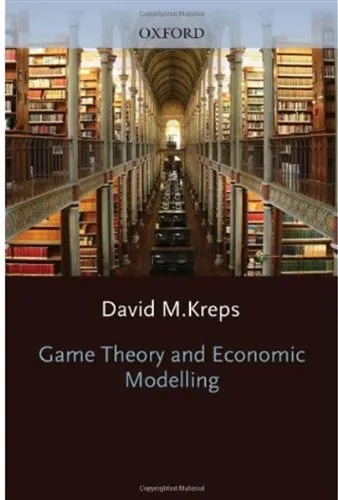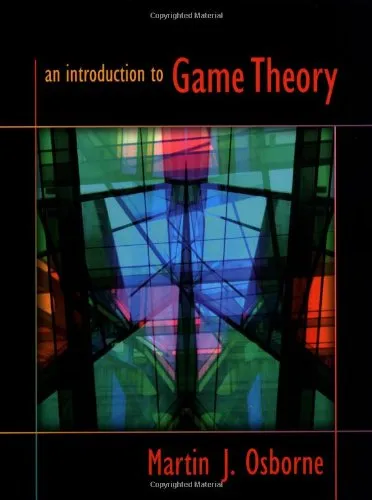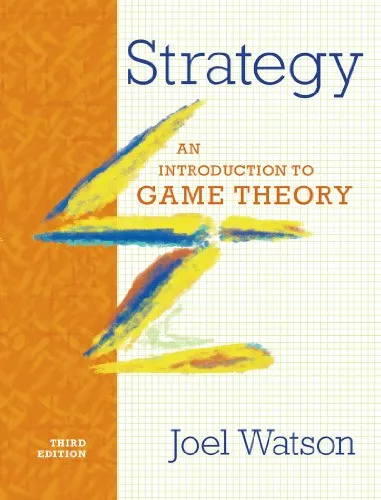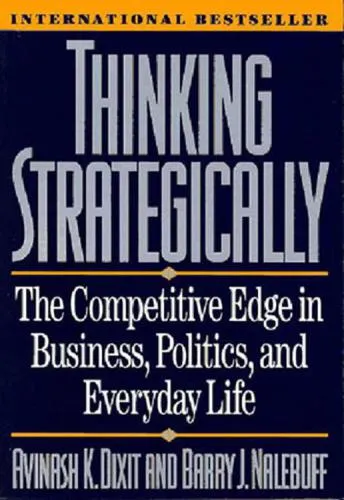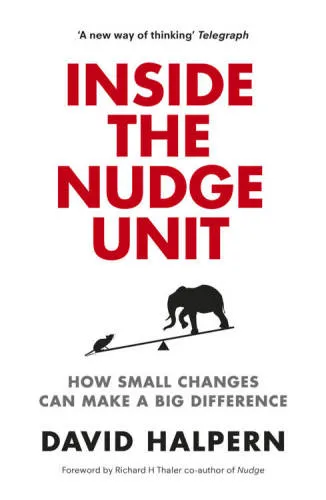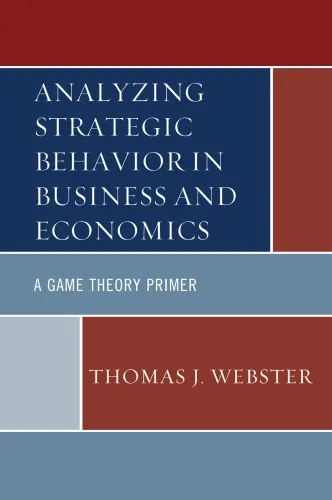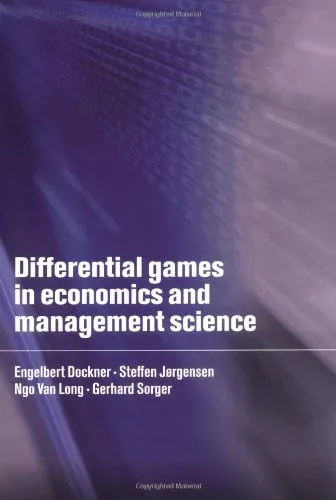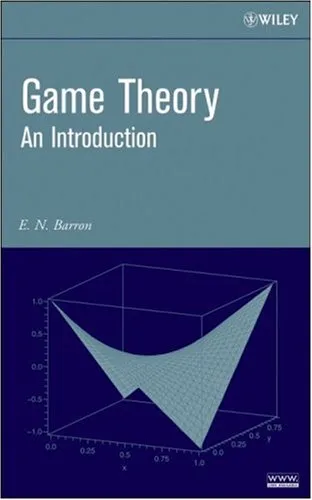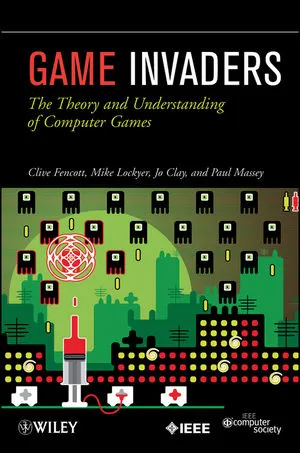Bounded Rationality and Industrial Organization
4.5
بر اساس نظر کاربران

شما میتونید سوالاتتون در باره کتاب رو از هوش مصنوعیش بعد از ورود بپرسید
هر دانلود یا پرسش از هوش مصنوعی 2 امتیاز لازم دارد، برای بدست آوردن امتیاز رایگان، به صفحه ی راهنمای امتیازات سر بزنید و یک سری کار ارزشمند انجام بدینکتاب های مرتبط:
معرفی کتاب «Bounded Rationality and Industrial Organization»
کتاب «Bounded Rationality and Industrial Organization» اثر من، ران اسپیگلر، به بررسی مفاهیم "عقلانیت محدود" و کاربردهای آن در حوزه سازمانهای صنعتی میپردازد. این کتاب به طور خاص تلاش میکند تا تأثیراتی که محدودیتهای شناختی در رفتار مصرفکنندگان و تصمیمگیریهای اقتصادی بر بازارها و صنایع دارند را تحلیل کند. در ادامه، به تفصیل درباره این اثر بحث خواهیم کرد.
خلاصه کامل کتاب
در این کتاب، مفهومی که برای اولین بار توسط هربرت سایمون معرفی شد، یعنی "Bounded Rationality"، بهصورت جامع در زمینه اقتصاد و سازماندهی صنعتی بررسی میشود. عقلانیت محدود به این اشاره دارد که انسانها در تصمیمگیریهای خود به دلایل مختلف مانند محدودیتهای زمانی، اطلاعاتی و پردازشی قادر به بهینهسازی کامل نیستند. این مفهوم اساسی کلید حل معماهای رفتاری در بازارهای واقعی است که مدلهای اقتصاد کلاسیک نمیتوانند توضیح دهند.
یکی از جنبههای اصلی این کتاب بررسی این نکته است که شرکتها چگونه از "رفتارهای غیرعقلانی" مصرفکنندگان بهره میبرند. در شرایطی که مصرفکنندگان اطلاعات ناقص دارند یا تصمیمگیریهای منطقی با هزینههای بالایی همراه است، شرکتها استراتژیهایی اتخاذ میکنند که از این محدودیتها به نفع خود استفاده میکنند. این استراتژیها میتوانند شامل طراحی قیمتگذاری پیچیده، ارائه محصولات کمکی یا بازاریابی هدفمند باشند.
همچنین در این اثر، تأثیر عقلانیت محدود بر رقابت بین شرکتها و ساختار بازارها بررسی میشود. بحثهایی پیرامون چگونگی شکلگیری انحصارها، نواقص بازار و اثرات کوتاهمدت و بلندمدت مهندسی انتخاب مطرح میشوند. هدف اصلی کتاب کمک به درک بهتر مکانیسمهای بازارها و یافتن روشهای سیاستگذاری اقتصادی برای بهبود اثربخشی بازارها است.
نکات کلیدی کتاب
- رفتار مصرفکنندگان در دنیای واقعی با فرضیات ساده مدلهای اقتصادی کلاسیک متفاوت است.
- عقلانیت محدود یک دیدگاه تحولآفرین برای تحلیل بازارها ارائه میدهد.
- شرکتها اغلب بهصورت استراتژیک از محدودیتهای شناختی مصرفکنندگان سوءاستفاده میکنند.
- سیاستگذاریهای اقتصادی و نظارتی میتوانند نقش مهمی در کاهش نواقص بازار ایفا کنند.
- تئوریهای مدرن میتوانند کمک کنند تا تعامل بین تصمیمگیری انسانی و ساختار بازار بهتر درک شود.
نقلقولهای معروف از کتاب
"Modeling decision-making as an idealized process of optimization often ignores the constraints that real-world agents face."
"Bounded rationality is not merely a limitation; it is a systematic reality reflecting how humans engage with complexity."
"Understanding how firms exploit cognitive biases requires rethinking the role of competition in shaping market behavior."
چرا این کتاب اهمیت دارد؟
کتاب «Bounded Rationality and Industrial Organization» دیدگاهی نوآورانه درباره تعاملات پیچیده میان رفتار انسانی و ساختارهای اقتصادی ارائه میدهد. در حالی که بسیاری از کتب اقتصاد سنتی بر فرض عقلانیت کامل و رفتارهای ایدهآل تأکید دارند، این اثر تلاش میکند واقعیتهای دنیای واقعی را به مدلهای اقتصادی وارد کند. اهمیت دیگر کتاب در این است که علاوه بر ارائه نظریهها، ابزارهایی عملی برای پژوهشگران، سیاستگذاران و حتی مدیران شرکتها فراهم میکند تا بتوانند درک عمیقتری از رفتار مصرفکنندگان و شکلدهی بازار کسب کنند. این رویکرد چندوجهی باعث میشود که کتاب هم برای جامعه آکادمیک و هم برای حرفهایهای صنعت جذاب و کاربردی باشد.
Introduction to "Bounded Rationality and Industrial Organization"
In the intricate web of modern economics, the concept of bounded rationality emerges as a lens through which we can better understand human behavior and market dynamics. "Bounded Rationality and Industrial Organization," authored by Ran Spiegler, explores the essential intersection between behavioral economics and industrial organization. This book makes a profound contribution by challenging traditional economic theories that assume perfect rationality and full information. Instead, it emphasizes the limitations of human decision-making and its implications for firm strategies, market structures, and policy design.
As the boundaries of rational behavior are scrutinized more closely, this book provides a well-rounded scaffolding to understand how consumers and firms often operate under constraints such as limited cognitive resources, incomplete information, and systemic biases. Covering a range of analytical models and empirical insights, the book sheds light on how these constraints influence pricing, competition, and market efficiency. Whether you're a scholar, policymaker, or industry professional, "Bounded Rationality and Industrial Organization" offers a cohesive framework to reimagine economic interactions and rethink strategy from a behavioral perspective.
Below, we delve deeper into the key aspects of the book, including a detailed summary, key takeaways, and its overall importance in reshaping economic thought.
Detailed Summary of the Book
The book opens by establishing the gap between classical economic theory, which assumes human rationality to be near perfect, and the behavioral realities of decision-making under constraints. It highlights the concept of bounded rationality as first introduced by Herbert Simon, identifying how individuals often rely on heuristics or rules of thumb to make decisions. This forms the foundational premise for Spiegler's exploration of industrial markets.
The book proceeds to dissect the behavior of consumers who misunderstand or misinterpret product attributes, pricing schemes, and market signals. These boundedly rational consumers often shape the pricing strategies employed by firms, which exploit cognitive limitations like biases, framing effects, or inattention. The result is a market landscape where competition is not predicated on merely lowering costs or improving quality, but also on manipulating consumer psychology.
Another prominent theme is how firms themselves may exhibit bounded rationality. The author examines decision-making distortions within firms, such as inertia in production strategies or flawed market forecasts, and how these impact market equilibrium.
Broadly, the book ties bounded rationality into industrial organization by addressing key topics such as price discrimination, oligopoly theory, consumer search behavior, and strategic firm interactions. With theoretical rigor and empirical examples, the book bridges economic theory with behavioral insights to produce a narrative that is as enlightening as it is intellectually stimulating.
Key Takeaways
- Human behavior in economic contexts is often bounded by cognitive and informational limitations, challenging the traditional assumption of perfect rationality.
- Consumer biases, inattention, and lack of transparency in markets create new avenues for firms to develop competitive strategies.
- Firms themselves are not immune to bounded rationality, leading to inefficiencies and shifting competitive dynamics.
- The coexistence of rational and boundedly rational agents in industries produces unexpected outcomes in pricing, product design, and market power.
- Policy interventions must consider behavioral complexities, moving beyond classical models to address real-world inefficiencies.
Famous Quotes from the Book
- "Bounded rationality is not merely a deviation from the norm of perfect rationality—it is the reality that drives most human decision-making."
- "In a world of bounded rationality, the firm's strategy is not only to produce efficiently but also to understand, anticipate, and exploit the limitations of consumers."
- "Understanding markets requires abandoning the fiction of perfect information and embracing the complexities of human cognition."
Why This Book Matters
The importance of "Bounded Rationality and Industrial Organization" lies in its ability to transform how we conceptualize economic interactions. Traditional economic theories, while elegant and influential, fall short in capturing the nuanced behaviors of real-world decision-makers. This book injects realism into economic modeling, enriching the discipline with behavioral insights that have far-reaching implications not only for researchers but also for practitioners and policymakers.
In an era where consumer biases and corporate strategies frequently intersect, this book is a timely resource. It equips readers with the tools to navigate and analyze markets dominated by imperfect decisions and cognitive constraints. Furthermore, its insights are pivotal for crafting policies that promote transparency, protect consumers, and ensure more equitable market outcomes.
For anyone interested in the intersection of economics, psychology, and strategy, "Bounded Rationality and Industrial Organization" is not just a book—it is a new way of thinking about how markets function and evolve. Its blend of theoretical depth and practical application reinforces its status as an essential addition to the libraries of thought leaders in economics and beyond.
دانلود رایگان مستقیم
شما میتونید سوالاتتون در باره کتاب رو از هوش مصنوعیش بعد از ورود بپرسید
دسترسی به کتابها از طریق پلتفرمهای قانونی و کتابخانههای عمومی نه تنها از حقوق نویسندگان و ناشران حمایت میکند، بلکه به پایداری فرهنگ کتابخوانی نیز کمک میرساند. پیش از دانلود، لحظهای به بررسی این گزینهها فکر کنید.
این کتاب رو در پلتفرم های دیگه ببینید
WorldCat به شما کمک میکنه تا کتاب ها رو در کتابخانه های سراسر دنیا پیدا کنید
امتیازها، نظرات تخصصی و صحبت ها درباره کتاب را در Goodreads ببینید
کتابهای کمیاب یا دست دوم را در AbeBooks پیدا کنید و بخرید
1424
بازدید4.5
امتیاز0
نظر98%
رضایتنظرات:
4.5
بر اساس 0 نظر کاربران
Questions & Answers
Ask questions about this book or help others by answering
No questions yet. Be the first to ask!
